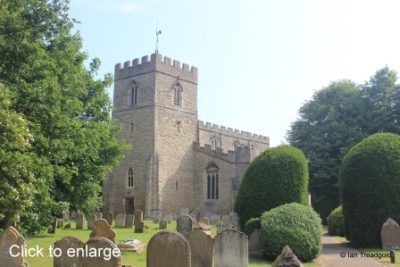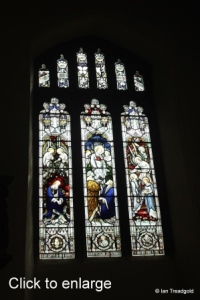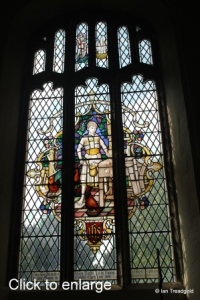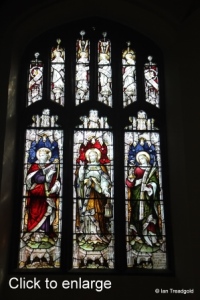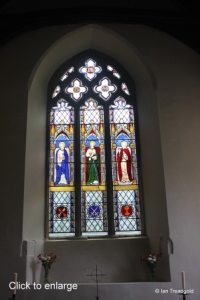The church of All Saints, Kempston is situated in Church End, some distance from the main part of Kempston, now a suburb of Bedford. The hamlet around the church has benefited by the A428 bypass which has diverted much traffic away from the area. The church is near the river Great Ouse and parking is by the roadside a short distance away from the church on the approach road.
Web Site: www.allsaintskempston.com
View Bedfordshire Parish Churches in a larger map
The church consists of a nave and chancel with north and south aisles, a west tower, two storey south porch and a vestry to the north of the chancel. The chancel is around 27 feet by 17 feet with the nave adding 48 feet by around 20 feet. The north aisle is about 9 feet wide and the south larger at around 14 feet. The tower is about 16 feet square and some 50 feet high. Parts of chancel and tower date from C12 whilst the nave and aisles were added in C13. The clerestory, south porch were added in C15. The window tracery was mainly renewed around this time.
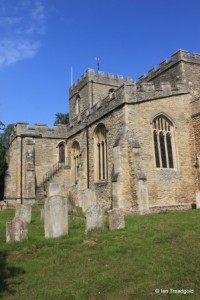
The south aisle has two south facing windows and windows to the east and west along with the two-storey porch.
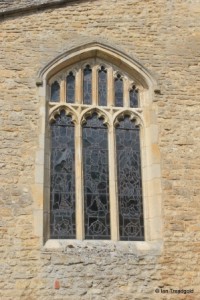
The east window of the aisle is of three cinquefoiled lights with perpendicular tracery above over a transom and under a pointed four-centred arch.
The glass dates from 1920 and was installed in memory of William Fitzpatrick.
In the three panes it shows Nathanael under the fig tree as described in John 1 v 43-51, Christ with Philip and Nathanael and Angels ascending and descending from heaven.
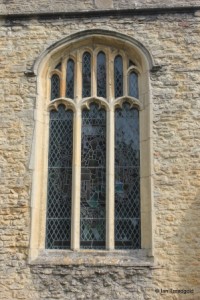
The two windows on the south side of the aisle are of three trefoiled lights with uncusped perpendicular tracery above under four-centred arches. The western window contains fragments of earlier stained glass.
The glass in the eastern window is dedicated to the memory of Harry Barker, presumably the son of the vicar of the time. In his memory a Children’s Church or Sunday School was formed in 1836. To cater for the children, galleries were built above the north and south aisles. Access to the gallery above the south aisle was by means of the staircase outside the porch and through the Priest’s Room above the porch. The galleries were removed in 1901.
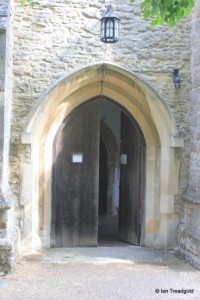
The porch was added in C15 with an external stair to the east.
There is also access from inside the church using a stair turret through a door at the west end of the south aisle.
The porch has a two-light trefoiled window to the west with a quatrefoil design in the head under a pointed arch.
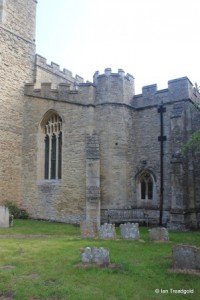
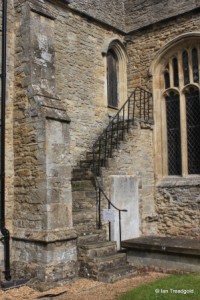
A similar window on the east side of the porch is blocked by the external stairs added in 1837.
On the west side of the outer doorway is a ‘mass dial’. This acted as a form of calendar with a central pointer being moved by the priest to indicate when Mass would next be said in the church.
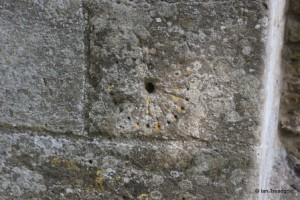
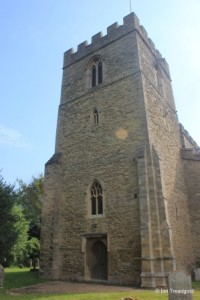
The Norman tower is of two stages with an internal stair in the south-west corner.
The buttress in the south-west corner was presumably rebuilt when the stair was added as it now differs from that on the north-west corner.
The west doorway is of C15 with a square head and a pointed sub-arch below. There is foliage decoration in the north spandrel but none in the south.
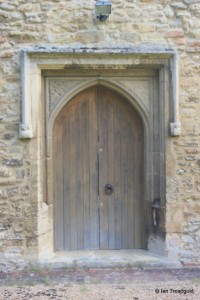
The west window of the south aisle is of three cinquefoiled lights with extensive perpendicular tracery above under a four-centred arch.
The church parapet is embattled throughout with the exception of the north side of the chancel and vestry.
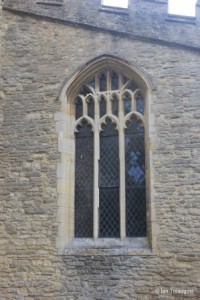
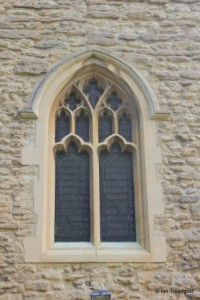
The west window is a modern window of two trefoiled lights with geometric tracery above under a pointed arch.
The belfry lights above are of two cinquefoiled lights under a two-centred head.
There are also smaller lights below the belfry stage.
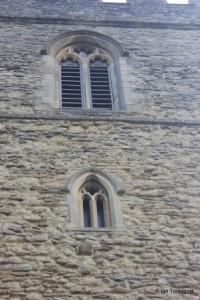
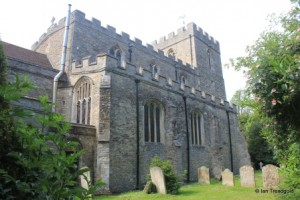
The north aisle is similar to the south with windows to the west and east and two to the north. There is no north doorway. The clerestory above has three two-light cinquefoiled windows under pointed arches.
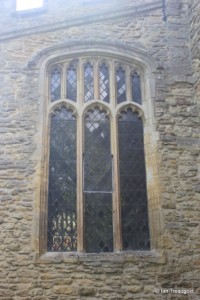
The west window is of three cinquefoiled lights with perpendicular tracery above under a flattened four-centred arch.
The north windows are both three-light trefoiled windows without tracery under flattened four-centred arches.
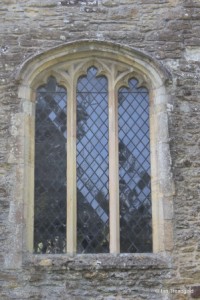
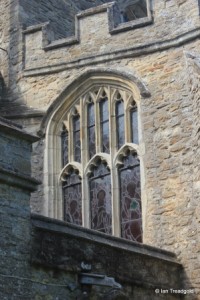
The east window is partly obscured by the extension to the original 1823 vestry westwards to meet the aisle. The window is of three cinquefoiled lights with high perpendicular tracery above under a four-centred arch.
The glass in the window dates from 1912 and was erected ‘In memory of Amy Christian the beloved wife of William Long FitzPatrick died August 1st 1910.
The glass depicts King David with a lyre, Christ as the light of the world and St John in the three panes.
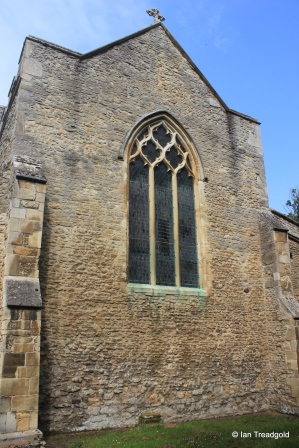
The modern east window is in C14 style and is of three trefoiled lights with geometric tracery above in the form of quatrefoils all under a pointed arch.
The glass in the window depicts St Peter with the keys to the kingdom of heaven, St John holding a book and St Paul holding a sword that represents the manner of his death.
The glass was inserted in 1852 and paid for by the Fitzpatrick family.
Inside, the font dates from C14 and is square with chamfered corners sitting on four three-quarter shafts with capitals and bases.
The carvings around the font are of Saints and the apostles. These carvings were damaged under the orders of Cromwell in C17.
The oak cover dates from 1901.
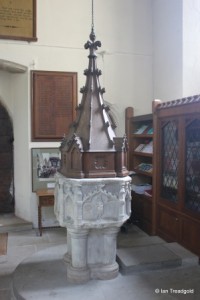
The south aisle holds an altar with a piscina. The arcades have three bays with the south arcade having a lower middle arch with the columns octagonal.
The north arcade columns are slightly earlier in design and are round.
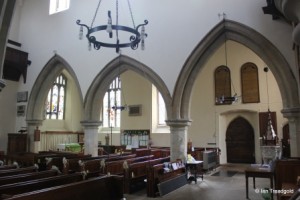
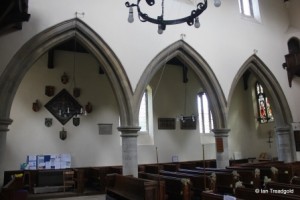
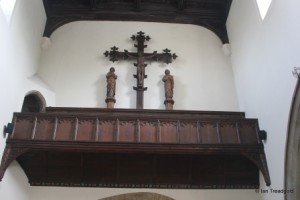
The chancel arch holds a modern rood with the rood staircase accessed from the north aisle.
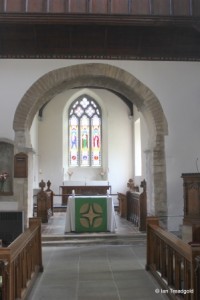
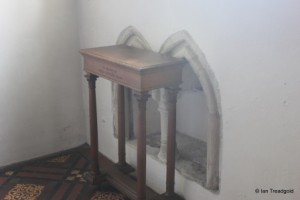
The main altar has a double piscina to the side with a central support column, an unusual feature in a church of this size.
The tower arch holds the organ with a gallery above accessible from the tower.
The organ dates from 1860 and was moved to its present location in 1889.
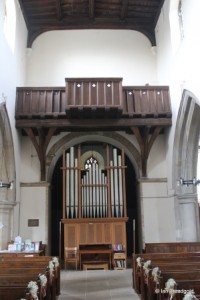
The north aisle holds two painted medieval panels believed to be from C15. Their origin is uncertain and may have come from another church to be hidden at the time of the dissolution of the monasteries. They tell the story of Adam and Eve from Genesis.
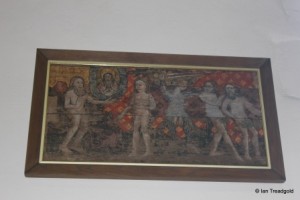
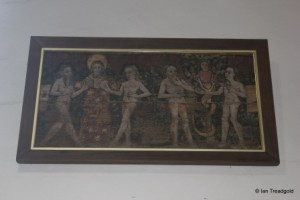
Page last changed 25/04/2020.

